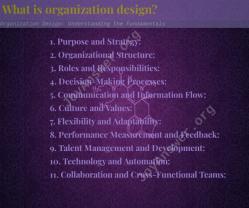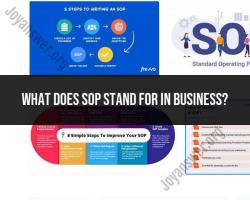What are the principles of Business Management?
Business management principles serve as guidelines for effective decision-making and organizational behavior. Here are some fundamental principles:
1. Planning:
- Goal Setting: Establish clear and achievable objectives.
- Strategic Planning: Develop strategies to achieve long-term goals.
- Resource Allocation: Allocate resources effectively to support plans.
2. Organizing:
- Structuring: Create an organizational structure that facilitates efficient workflow.
- Delegation: Assign responsibilities and authority to the right individuals or teams.
- Coordination: Ensure departments work together harmoniously.
3. Leading:
- Leadership: Inspire, guide, and motivate employees toward common goals.
- Communication: Foster open and effective communication throughout the organization.
- Decision-Making: Make informed decisions and encourage innovation.
4. Controlling:
- Performance Measurement: Set benchmarks and standards for evaluation.
- Monitoring: Regularly review performance and compare it against set standards.
- Corrective Action: Take necessary steps to address deviations from plans.
5. Staffing:
- Recruitment and Selection: Hire and place individuals with the right skills and qualifications.
- Training and Development: Provide opportunities for skill enhancement and growth.
- Retention: Foster a positive work environment to retain talent.
6. Adaptability:
- Flexibility: Adapt to changes in the business environment.
- Innovation: Encourage and support creativity and new ideas.
- Agility: Respond quickly to market changes and new opportunities.
7. Customer Focus:
- Customer-Centric Approach: Prioritize customer needs and satisfaction.
- Relationship Building: Develop strong relationships with customers.
- Continuous Improvement: Continuously refine products/services based on customer feedback.
8. Ethics and Social Responsibility:
- Ethical Behavior: Uphold ethical standards in all business practices.
- Corporate Social Responsibility (CSR): Contribute positively to society and the environment.
9. Risk Management:
- Identification: Recognize potential risks and uncertainties.
- Mitigation: Develop strategies to minimize and manage risks effectively.
- Contingency Planning: Have backup plans for unexpected situations.
10. Continuous Improvement:
- Kaizen: Embrace a culture of continuous improvement at all levels of the organization.
- Learning Organization: Encourage learning and development to evolve with changing times.
These principles are not rigid rules but guidelines that can be adapted and applied differently based on the unique needs and circumstances of each organization. Effective business management involves understanding these principles and applying them in a way that best serves the organization's goals and stakeholders.
1. Fundamental Principles of Business Management
Effective business management encompasses a range of principles that guide decision-making, resource allocation, and strategic planning to achieve organizational goals. These principles form the foundation for successful businesses and contribute to their long-term sustainability. Here are some fundamental principles of business management:
1. Goal Setting and Planning: Establish clear and measurable goals to provide direction and focus for the organization. Develop comprehensive plans to achieve these goals, outlining strategies, timelines, and resource allocation.
2. Customer Focus: Understand and prioritize customer needs, preferences, and expectations. Strive to deliver superior customer service and create a positive customer experience to foster loyalty and repeat business.
3. Effective Communication: Maintain clear, consistent, and transparent communication channels within the organization and with external stakeholders. Encourage open communication, feedback, and collaboration among employees.
4. Efficient Operations: Streamline processes, eliminate waste, and optimize resource utilization to enhance operational efficiency. Implement technology and automation where appropriate to improve productivity and reduce costs.
5. Financial Management: Manage financial resources effectively to ensure the organization's financial health and stability. Develop financial plans, budgets, and forecasts to control expenses, generate revenue, and maximize profitability.
6. Human Resource Management: Attract, develop, and retain talented individuals to build a high-performing workforce. Implement effective HR practices, including training, performance management, and rewards and recognition programs.
7. Market Analysis and Adaptation: Continuously monitor and analyze market trends, competitor activities, and customer behavior to adapt business strategies and remain competitive.
8. Innovation and Adaptability: Foster a culture of innovation and encourage creative problem-solving to adapt to changing market conditions and technological advancements.
9. Ethical Conduct and Social Responsibility: Conduct business with integrity, ethical standards, and social responsibility. Adhere to legal and regulatory requirements, promote sustainability practices, and contribute to the communities in which the organization operates.
2. Contribution of Business Management Principles to Organizational Success
Adherence to sound business management principles plays a crucial role in achieving organizational success in various aspects:
1. Strategic Alignment: Business management principles provide a framework for aligning organizational goals, strategies, and actions, ensuring that everyone is working towards a shared vision.
2. Decision-Making: These principles guide decision-making processes, ensuring that choices are informed, well-considered, and aligned with the organization's overall objectives.
3. Resource Optimization: Effective management of resources, including human capital, financial assets, and physical resources, is essential for cost-efficiency, productivity, and long-term sustainability.
4. Competitive Advantage: By applying business management principles effectively, organizations can gain a competitive advantage in the market by improving their operations, enhancing customer satisfaction, and fostering innovation.
5. Organizational Culture: Strong business management principles contribute to a positive and productive organizational culture, characterized by collaboration, accountability, and a shared commitment to success.
6. Risk Mitigation: Adherence to ethical standards, legal compliance, and sound financial management practices helps organizations mitigate risks and maintain their reputation.
3. Key Theories and Models in Business Management
Several theories and models provide frameworks and insights for understanding and applying business management principles. These include:
1. Classical Management Theory: This theory emphasizes scientific management principles, such as division of labor, standardization, and performance measurement, to improve efficiency and productivity.
2. Neoclassical Management Theory: This theory focuses on human factors and behavioral aspects of management, emphasizing motivation, leadership, and organizational behavior.
3. Modern Management Theory: This theory encompasses a wide range of perspectives, including systems theory, contingency theory, and decision theory, to address complex business challenges and adapt to diverse environments.
4. Strategic Management Theory: This theory focuses on strategic planning, competitive analysis, and organizational change to achieve long-term organizational success.
5. Organizational Behavior Theory: This theory examines the behavior of individuals and groups within organizations, providing insights into motivation, leadership, communication, and organizational culture.
These theories and models provide valuable tools for understanding and applying business management principles effectively, enabling organizations to make informed decisions, optimize resource allocation, and achieve their strategic goals.












